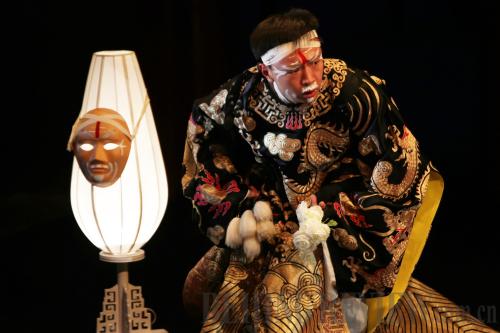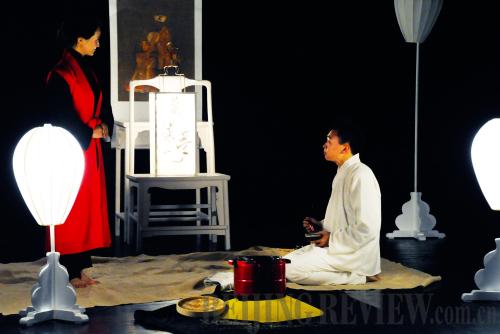|
 |
 |
|
DESIRE: Lu Sheng (played by Dong Wenliang) in Cooking a Dream wears ancient Chinese noble robe, showing that he achieves fame and wealth in his dream (COURTESY OF YANG SISI) |
AWAKENING: In a stage photo of Cooking a Dream, Lu Sheng (played by Dong Wenliang) awakens from his fantastic dream and realizes the true nature of life (COURTESY OF YANG SISI) |
The theater became a place of recreation for dramatists during the middle of the 19th century, when Peking Opera experienced a boom in popularity. It hosted many celebrities of the Peking Opera renaissance, including Cheng Changgeng (1811-80), Tan Xinpei (1847-1917) and Mei Lanfang (1894-1961). When the War of Resistance Against Japanese Aggression broke out in 1937, the theater was overwhelmed in the chaos and remained silent for over 60 years.
In 1994, the Zheng Yi Ci Theater received a favorable turn. Wang Yuming, an enthusiastic entrepreneur from Zhejiang Province, discovered the decrepit theater in an alley by chance and decided to restore it. Wang invited many artists and celebrities to celebrate the reopening of the theater. But it is difficult for a person to accomplish much single-handedly. Wang's passion and funds did not sustain the theater for long. It closed again in 1996.
The non-profit Beijing Traditional Culture Protection Development Foundation took control of the theater in 2006 and reopened it once again to great expectations that sound management could protect the site. The performing artists of Xinhuayaji ensure steady box office revenue. Furthermore, the ancient theater hosts significant events, such as a project launch ceremony attended by U.S. Ambassador to China Gary Locke in December, 2011.
The Zheng Yi Ci Theater is regarded as a living fossil of the traditional Chinese stage. Coincidentally, retro experimental dramas perfectly fit the antique architectural style of the theater. Therefore, the 2011 Winter Drama Season seems like a dialogue between the ancient and modern through the veil of time.
Cooking a Dream, directed by Huang Ying, is inspired by a fable written by Shen Jiji during the Tang Dynasty (618-907). The original tale takes place at an inn, where a young man named Lu Sheng laments his miserable luck to a Taoist monk. The monk gives him an enchanted pillow and bids him to sleep while the innkeeper cooks millet. Consequently, Lu experiences a series of lucky strokes, marrying the daughter of a rich man and amassing a great wealth only to suffer the vicissitudes of life as a high official before waking up in the inn, still awaiting his millet.
An example of a story within a story, the tale in turn inspired a multitude of Chinese idioms, such as huang liang mei meng (beautiful millet dream), which expresses a quintessentially Chinese philosophical sentimentality for the simple things in life.
The drama debuted on July 8 at the 2011 Avignon Theatre Festival in Avignon, France, winning unexpected praise. Particularly, Huang Ying and his team prepared the cooked millet for audiences when the play was over, giving them a surprise and a real taste of Chinese flavor.
The drama is full of traditional Chinese cultural elements and symbols, such as elaborate facial makeup and costumes, pingtan (a Suzhou City vocal style), sanxian (a three-stringed plucked instrument), calligraphy and classical long-sleeved dances. However, the drama is not limited to the original story. The director revised the story with his understanding and contemporary ideas. At last, Huang wants to tell people that "cherish what you have now because inner peace is the most valuable wealth of a person."
"Traditional culture is inherited in our blood and veins from our ancestors even though the lifestyle of Chinese people has radically changed. So this drama can be regarded as a connection between the traditional and the contemporary. And for this time, the Zheng Yi Ci Theater provides a perfect traditional atmosphere for Cooking a Dream," said Huang.
Huang has been looking for creative inspiration from ancient Chinese culture and traditional stage art. Cooking a Dream is a new attempt. "In my view, Chinese artists should make innovations to traditional stage art to conform to contemporary life."
Indeed, the question about how to inherit and promote China's cultural essence concerns all Chinese people. The Zheng Yi Ci Theater and its winter drama season have made a positive attempt to answer it.
Email us at: baishi@bjreview.com | 